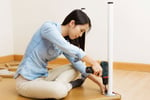
Twelve. It’s a glorious age of independence and new opportunities. In Queensland, 12 is the age your child can legally be left home unsupervised, walk to the shops on their own or take the bike to the beach without their parents in tow. Babysitters and after school care may no longer be required. You can’t send your child to school in an Uber yet – they need to be 18 for that – but you can start to shift more responsibility to your child: Send them off to Coles to do the weekly shop and pick them up afterwards; leave them to do their homework while you take their sibling to soccer club; let them walk to the library to return their books on their own etc…
… But would you?
For parents who have spent 12 years ensuring their children are supervised, cared for and protected – i.e. most of us – this can be a giant leap. And just because your child has reached the golden age of liberation, it doesn’t necessarily mean they are ready to take advantage of it.
It is, however, an important part of growing up and something you should be working towards. Being able to leave your child at home unattended for short periods of time can help grow their confidence, teach them to problem-solve and build self-sufficiency.
Things to consider before leaving your child home alone
Maturity of your child
- Is your child a risk-taker or rule-breaker or are they generally obedient?
- Are they nervous, anxious or frightened when left alone?
- Can they make sensible decisions and cope with the unexpected?
Readiness of your child
- Do they know what to do in an emergency?
- Do they know how everything works in the house, e.g. locks, alarms, phone?
- Do they feel they're ready to be left alone? Some kids can't wait. Others may need a little more time.
Safety of house and neighbourhood
- Are your smoke alarms in working order?
- Are there any obvious danger hazards in your home or garden?
- Do you live in a remote area or are there helpful neighbours nearby?
How long they will be left on their own
12 is not the age to leave your child alone while you take off on a weekend break!
- How long do you think your child will cope on their own before they get bored, distressed, worried etc?
- Is there anything specific they will need to do while you’re out, eg feed themselves, shower, put themselves to bed? Are you comfortable with this?
What about siblings?
The law is fuzzy about younger siblings. The Queensland Criminal Code, section 364a, stipulates that a parent who leaves a child under 12 “for an unreasonable time without making reasonable provision for the supervision and care of the child during that time, commits a misdemeanor”. Can a child of 12 provide “reasonable provision”? It depends on the maturity of the child and the length of time you are absent, of course, but it’s best to err on the side of caution. Being able to look after oneself is a whole different ball game to caring for someone else. And what if they argue or fight?
And friends?
Friends from school or friends from the neighbourhood who call round to play – should you let them stay in the house with your child while you're out? On one hand, having company may be reassuring for a nervous child. On the other … do you really want to take responsibility for someone else’s child should something happen in your absence?
Tips for parents
Build up gradually
Start by leaving your child alone for 10 minutes while you pop out on an errand or visit a neighbour. Leave them for an hour while you do a supermarket shop. Don't just disappear for an afternoon until you know that your child has the experience and confidence to deal with it.
Use routine
It may be helpful to introduce regular times in the week when your child is expected to fend for themselves, e.g. on Tuesdays when you take their younger sibling to sports practice or Saturday mornings when you do the family shop.
Give them a task
Going out for an hour? Assign your child job or two to get on with in your absence, eg complete homework, set the table for dinner, sort the laundry. This will give a bored or anxious child some focus.
Be clear
Make sure your child knows:
- Where you are going.
- How long you expect to be out.
- How they can get hold of you should they need to.
Set some ground rules
Ensure your child knows what they are allowed to do and what is expected of them.
For example, are they allowed to cook, answer the phone, open the door if someone knocks, or swim in the pool when you're out? Are they permitted to use electronic devices or go on the internet?
If more than one child is being left alone, establish who is in charge.
Be prepared
Make sure your child knows who to call for help. Is there a neighbour they can run to? Do they have all the phone numbers they may need?
Check that your child knows what to do in an emergency. Go over possible scenarios with them - eg if there is a fire, get out of the house immediately and ring 000 from a neighbour's house. If the dog goes missing, don't run off looking for it. Stay at home and wait till I return. If you've lost your key when you get home, use the emergency one in the plant pot or wait for me next door.
Consider writing up an emergency plan so that your child has something to refer to.
Check that everything is working properly in your house, e.g. alarms, locks, phones etc.
Check in
Out for a while? Give them a call to see how they're doing. Ask a neighbour to pop by to check they're okay.
Don't discount babysitters
Just because your child is comfortable being home alone for an hour or two, it doesn't mean they will cope (or you will trust them to behave) for a whole afternoon. Continue to make use of trusted adults to supervise and look after your adolescent kids where appropriate, eg when you are out late or when they need feeding. Maybe Grandma could come over for part of the period you are away or they could have dinner at a neighbour's.










